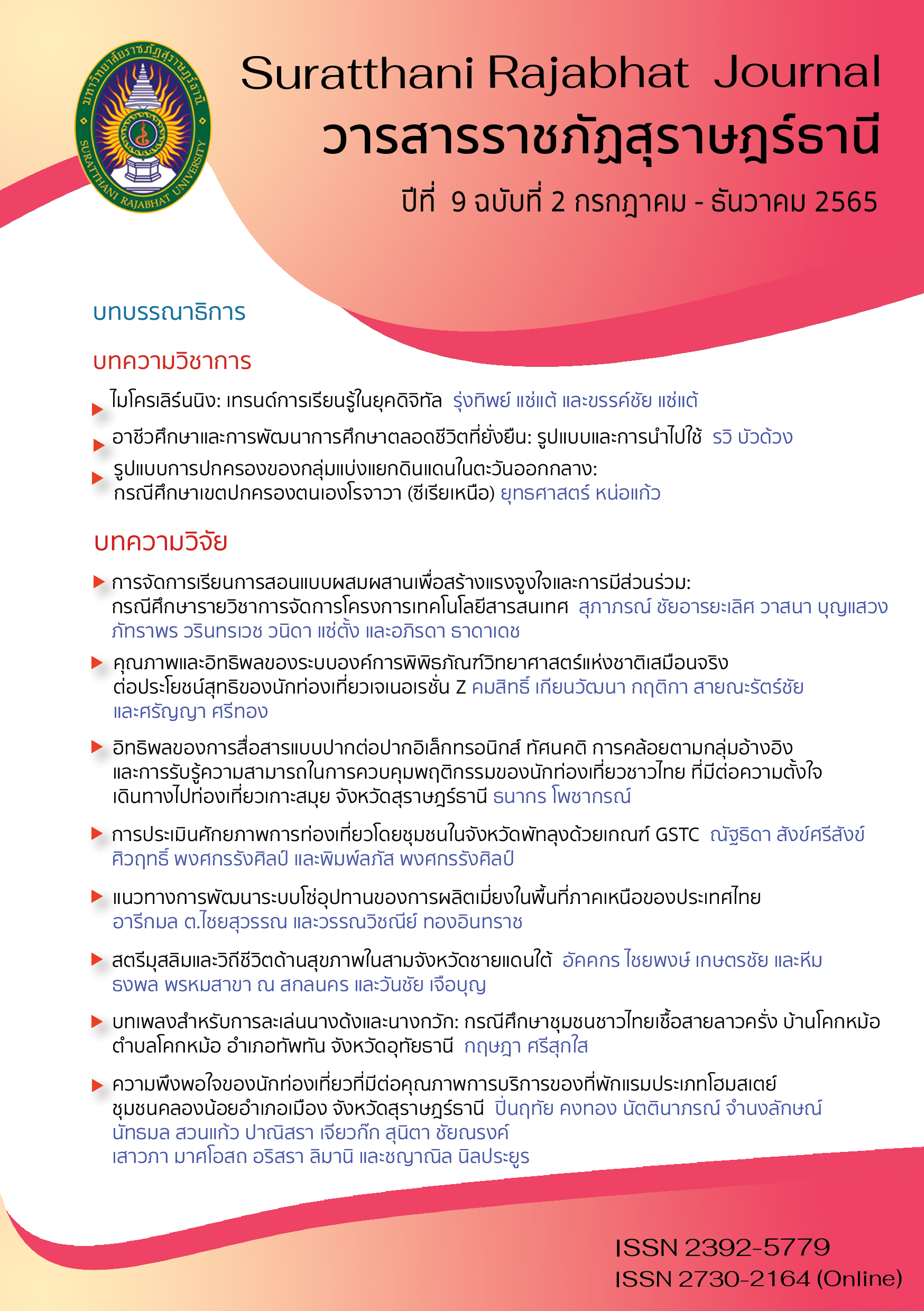The Separatist Forms of Government in the Middle East: A Case Study of Rojava Autonomous Region (Northern Syria)
Main Article Content
Abstract
This article aims to study the forms of governance within the territory occupied by the Kurdish people who live in northern Syria or known as “Rojava”, and the administration focused on the important of people’s participation in community. The origin of this land is the aftermath event called “Arab Spring”, in Arab world which has turned into a civil war in the Middle East region. Thus, this allowed Kurdish groups in Syria to unite and hold a referendum in order to request a separation and establish an autonomous region by adhering to the principle of the people racial inclusion in the area. The framework of study is focused on the nature of the Kurdish rule’s style in the war-torn Rojava region, the result showed “the Rojava Autonomous Region” had a new form of governance known as “the Federal Democratic Republic”. Which is not appear to have a Constitution, Head of state, Central government, the police, or even the state army. But, it is the government that emphasizes all power bases give to the community in each location where also known as “communes”. Furthermore, the administrative powers of the communes in each place cannot interfere with the governance between them, and there are the independent local administrations in each other. Each community consists of The 6 Parts Community Committee as follows: 1) Self-Defense Committee, 2) Health Committee, 3) Peace Committee 4), Economic Committee 5), Education Committee/Youth Committee, and 6) Women's Committee. All of these are the highest political institution power which has to govern each community; it is based on the principle of power from the bottom up, and integrates the principles of checks and balances within the community all together. Each commune does not need to take account the provisions, rules, penalties are different from other communes in any way.
Article Details

This work is licensed under a Creative Commons Attribution-NonCommercial-NoDerivatives 4.0 International License.
References
โกวิท วงศ์สุรวัฒน์. (2547). การเมืองการปกครองไทย : หลายมิติ. กรุงเทพมหานคร: ภาควิชารัฐศาสตร์และรัฐประศาสนศาสตร์ คณะสังคมศาสตร์ มหาวิทยาลัยเกษตรศาสตร์.
โกวิท วงศ์สุรวัฒน์. (2559, 28 กันยายน). ชาวเคิร์ดแห่งประเทศเคอร์ดิสถานผู้อาภัพ โดย โกวิท วงศ์สุรวัฒน์. https://www.matichon.co.th/columnists/news_301053.
จักรกริช สังขมณี. (2544). บรรณวิพากษ์ ศิลปะวิถีของการไม่ถูกปกครอง: ประวัติศาสตร์อนาธิปไตยของคนไร้รัฐในเอเชียอาคเนย์. วารสารเมืองโบราณ, 37(1). 177-181.
ณรงค์กร มโนจันทร์เพ็ญ. (2560, 28 กันยายน). ‘ชาวเคิร์ด’ ชาติพันธุ์ชนกลุ่มน้อยที่ใหญ่ที่สุดในโลกกำลังต่อสู้เพื่อประเทศใหม่ของตัวเอง. https://thestandard.co/the-kurdish-population/.
ณรงค์กร มโนจันทร์เพ็ญ. (2561, 18 เมษายน). เกิดอะไรในซีเรีย? เข้าใจสงครามซีเรียแบบย่อยง่าย ๆ กับ 2 ผู้เชี่ยวชาญการเมืองตะวันออกกลาง. https://thestandard.co/syria-war-in-expert-opinion/.
ณัฐกร วิทิตานนท์. (2557). หลักรัฐธรรมนูญเบื้องต้น. (พิมพ์ครั้งที่ 3). กรุงเทพมหานคร: จุฬาลงกรณ์มหาวิทยาลัย.
เด่นพงษ์ แสนคำ, และอัครยา สังขจันทร์. (2562). ปรัชญาสังคมของคาร์ล มาร์กซ์: บทวิเคราะห์ว่าด้วยปัญหาความเสมอภาค Karl Marx’s Social Philosophy: An Analysis Problem of Equality. วารสารวิชาการนวัตกรรมสื่อสารสังคม, 7(1), 74-83.
ทศพร มะหะหมัด. (2557). การเปลี่ยนผ่านทางการเมืองในความขัดแย้งของโลกอาหรับ : กรณีศึกษา ตูนีเซีย อียิปต์ ลิเบียและซีเรีย. วารสารเกษมบัณฑิต, 15(1), 122-139.
ไทยรัฐออนไลน์. (2563, 21 ธันวาคม). ย้อนรอย 1 ทศวรรษ "อาหรับสปริง" เมื่อคลื่น แห่งการปฏิวัติซัดกลับมาอยู่จุดเดิม. https://www.thairath.co.th/news/foreign/1998040.
ธงชัย วินิจจะกูล. (2563, 9 มีนาคม). นิติรัฐ อภิสิทธิ์ และราชธรรมนิติธรรม ประวัติศาสตร์ภูมิปัญญาของ RULE BY LAW แบบไทย. https://waymagazine.org/thongchai-winichakul-rule-by-law/.
บูฆอรี ยีหมะ. (2552). ความรูเบื้องต้นทางรัฐศาสตร์. (พิมพ์ครั้งที่ 2). กรุงเทพมหานคร: จุฬาลงกรณ์มหาวิทยาลัย.
ปรีชา เปี่ยมพงศ์สานต์. (2558). เศรษฐศาสตร์การเมืองและทฤษฎีสังคมวิพากษ์. (พิมพ์ ครั้งที่ 2). ขอนแก่น: คณะมนุษยศาสตร์และสังคมศาสตร์ มหาวิทยาลัยขอนแก่น.
ยุทธศาสตร์ หน่อแก้ว, และพัชรี จิตเอื้ออังกูร. (2564). บทวิเคราะห์เปรียบเทียบการจัดตั้งองค์กรปกครองส่วนท้องถิ่นรูปแบบคณะกรรมการตามหลักการกระจายอำนาจและการปกครองรูปแบบคณะกรรมการของสหพันธรัฐประชาธิปไตย กรณีศึกษาเขตปกครองตนเองโรจาวา (ซีเรียเหนือ). วารสารมนุษยศาสตร์และสังคมศาสตร์ มหาวิทยาลัยราชภัฏอุบล, 12(2), 1-11.
ยาสมิน ซัตตาร์. (2561). พลวัตความสัมพันธ์ระหว่างตุรกีกับตะวันออกกลาง: พัฒนาการและที่มาของความสัมพันธ์. วารสารเอเชียปริทัศน์, 39(2), 41-69.
เรืองวิทย์ เกษสุวรรณ. (2553). หลักรัฐศาสตร์. (พิมพ์ครั้งที่ 4). กรุงเทพมหานคร: บพิธการพิมพ์
ศิลปวัฒนธรรม. (2562, 15 ตุลาคม). การต่อสู้ของ “เคิร์ด” (Kurd) ชาติพันธุ์แห่งตะวันออกกลาง รบเพื่อเอกราช-ปกครองตนเอง. https://www.silpa-mag.com/history/article_40310.
สากล พรหมสถิต. (2560). เอกสารประกอบการสอน รายวิชากฎหมายรัฐธรรมนูญและสถาบันการเมือง. สาขาวิชารัฐประศาสนศาสตร์ คณะมนุษยศาสตร์และสังคมศาสตร์ มหาวิทยาลัยราชภัฏบุรีรัมย์.
สุรีย์ สุวรรณปรีชา. (2520). ความสัมพันธ์ระหว่างทฤษฎีความรู้และทฤษฎีการเมืองของปอบเปอร์. วิทยานิพนธ์ อม. (ปรัชญา). กรุงเทพมหานคร: บัณฑิตวิทยาลัย จุฬาลงกรณ์มหาวิทยาลัย.
Bookchin, M. (1994). What is communalism? The democratic dimension of anarchism. Green Perspectives 31, (October).
Cohen, G. A. (1978). Karl Marx’s Theory of History: A Defense. Oxford: Oxford University Press.
DinDeng. (2563, 31 May). สวรรค์จากเถ้าถ่าน. http://www.dindeng.com/rojava/
Elassar, A. (2019, 10 October). Who are the Kurds and why are they under attack?. https://edition.cnn.com/2019/10/09/world/kurds-in-syria-explainer-trnd/index.html
Jenks, C. (1998). Core sociological dichotomies. New Delhi, India: Sage.
Knapp, M. & Jongerden, J. P. (2016). Communal Democracy: The Social Contract and Confederalism in Rojava. Comparative Islamic Studies, 10(1), 87-109.
Leezenberg, M. (2016). The ambiguities of democratic autonomy: the Kurdish movement in Turkey and Rojava. Southeast European and Black Sea Studies, 16(4), 671-690.
Madawi, A. R. (2002). A History of Saudi Arabia. Cambridge: Cambridge University Press.
Neighbor Democracy. (2018,6 July). The Communes of Rojava: A Model In Societal Self Direction. https://www.youtube.com/watch?v=cDnenjIdnnE.
Roskin, M., Cord, R., Medeiros, J & Jones, W. (1997). Political Science: An Introduction. New Jersey: Prentice-Hall International, Inc.
Rougerie, J. (2004). Paris libre 1871. Pocket Book: Points.
Sassen, S. (2002). Towards Post-National and Denationalized Citizenship. In Handbook of Citizenship Studies, edited by E.F. Isin and B. S. Turner.
Scott, J. C. (2009). The Art of Not Being Governed: An Anarchist History of Upland Southeast Asia. New Haven: Yale University Press
Tombs, R. (1981). The War Against Paris, 1871. Cambridge: Cambridge University Press.
Voice online. (2555, 1 มกราคม). อาหรับสปริง : จุดเริ่มต้นการเปลี่ยนแปลงในตะวันออกกลาง. https://www.voicetv.co.th/read/26885.


